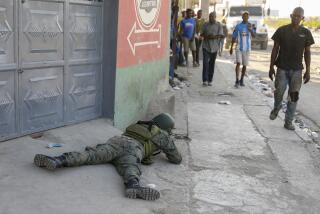U.S. Is Losing Patience With Aristide, Official Asserts : Haiti: His reluctance to compromise is said to frustrate the Administration. Leader’s aide dismisses the criticism.
- Share via
WASHINGTON — The Clinton Administration is losing patience with exiled Haitian President Jean-Bertrand Aristide’s reluctance to consider sharing power or making other compromises that might soften the Haitian military’s refusal to permit him to return to office, a State Department official said Monday.
“There is some frustration” with Aristide’s attitude, the official said after U.S. and allied diplomats conferred with the island’s elected president about how to restore democracy following a bloody military coup 27 months ago.
Although the Administration insists that it has not abandoned efforts to restore Aristide to power, the official’s comment indicated that the U.S. government is distancing itself from the Roman Catholic priest, who was swept into office by Haiti’s impoverished majority but was pushed out by the military and its affluent backers.
Michael Barnes, a former Democratic congressman who serves as Aristide’s lawyer, dismissed the criticism.
“Anonymous sources in the State Department do their thing, but the U.S. government remains committed to restoring President Aristide,” he said.
Secretary of State Warren Christopher said last week that Aristide is the country’s “duly elected president” and must be part of any program to restore democracy. But U.S. officials are saying privately that Aristide seems intent on asserting his right to regain all of his lost powers, even if that means he will never be able to go home.
The United States had pinned its hopes for an end to the standoff on a conference of all Haitian factions, proposed by Prime Minister Robert Malval. But Malval scrapped the conference last week after both Aristide and his military foes rejected the idea. Malval then submitted his own resignation, as he had promised to do months ago.
State Department spokeswoman Christine Shelly said that Washington hopes the conference idea can be revived, although Malval has said the plan is dead.
“We felt that the proposal had a lot of merit, and I would say that we’re certainly not writing it off at this point,” Shelly said.
Nevertheless, Shelly said that Lawrence Pezzullo, the Administration’s chief strategist on Haiti; Dante Caputo, the special envoy of the United Nations and the Organization of American States, and representatives from France, Canada and Venezuela met Monday with Aristide to try to devise a new strategy to revive the international effort to restore democracy.
She said the meeting “discussed the current diplomatic situation and explored with President Aristide the ways that the current impasse might be resolved.” She declined to reveal details.
Barnes described the session as “a very good meeting.” He said that all participants reaffirmed their commitment to restoring Aristide to power.
Military representatives of the United States, France, Canada and Venezuela--styling themselves as the “four friends” of Haiti--are expected to meet in Port-au-Prince this week with Haitian military leaders. U.S. officials said that the military delegation is authorized only to try to persuade the Haitian army to permit Aristide’s return, not to attempt to negotiate anything new.
The United Nations has imposed an economic embargo on Haiti to pressure the military to relinquish power. U.S. officials said that the island is expected to run out of gasoline and other fuel sometime next month. The officials said they expect the army to agree to restore democracy once the fuel supply dries up, but the four-nation group already has agreed to seek a tougher embargo if the one now in force fails to produce results.
More to Read
Sign up for Essential California
The most important California stories and recommendations in your inbox every morning.
You may occasionally receive promotional content from the Los Angeles Times.













